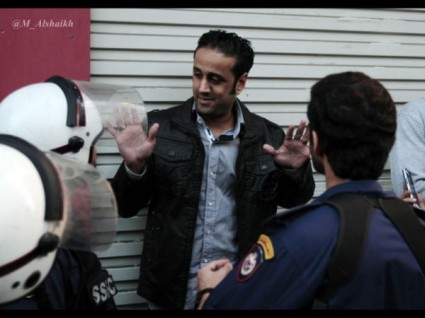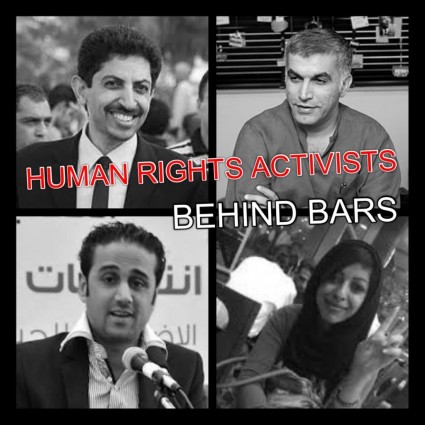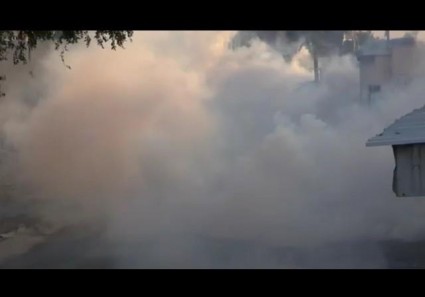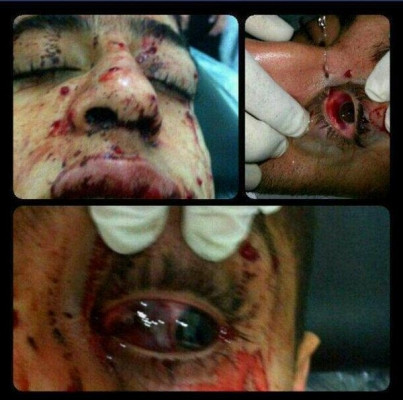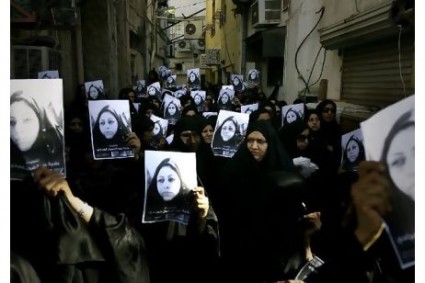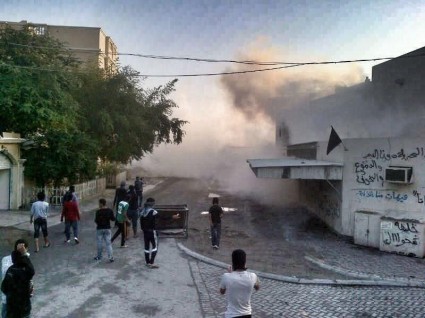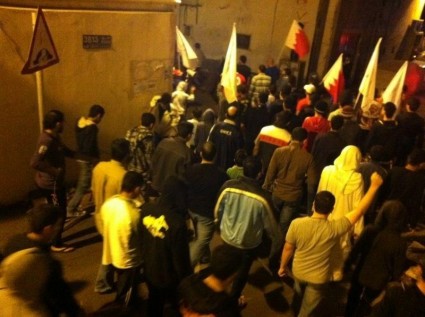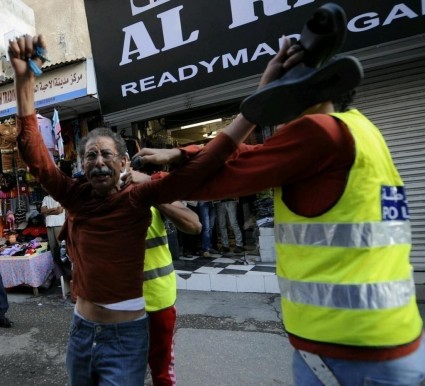Posts from — December 2012
Bahrain Activist Masooma Al-Sayed further victimised by new trumped up charges to prolonging detention
Bahrain: Detained Activist Masooma Al-Sayed is Facing Trumped up Charges Aimed at Prolonging her Detention
22 December, 2012 – Bahrain Center for Human Rights
Activist Masooma Al-Sayed continued o be held in detention on trumped up charges after she was arbitrarily arrested on 21st September 2012 following her participation in a peaceful protest called for by the 14th Feb Youth Coalition in the capital Manama. The use of excessive force during the arrest caused bruises on her hands and legs.(1) Masooma is a mother of two, Al-Hur (7 years old) and Nouh (5 years old) and suffers from sickle cell disease.
AlSayed was accused of “illegal protesting” pending trial while detained. The judge kept postponing the trial for 1 month and 21 days.
On 11th November 2012 Masooma AlSayed was to be released without a verdict, but when her family went to the police station to receive her, the police denied her released because on the same day she was accused of insulting police officer Fareeda Khamees.
AlSayed was taken to the public prosecution on 14th November 2012, and her detention was extended until the 18th November 2012. On the 18th of November, the public prosecution decided to renew her detention for another 10 days pending trial which was renewed again to 4th December 2012.
On 4th December, Masooma AlSayed was sentenced to 3 months imprisonment for insulting a police officer. On the appeal date, which was 19th December, AlSayed and her lawyer were surprised to find that the lower criminal court did not add the necessary documents to her file, which is a prerequisite for the appeal court. This resulted in postponing the appeal until 7th January 2013, then AlSayed’s total number of days spent in detention will be 3 months and 17 days.
It is the belief of Masooma AlSayed’s family that the documents were intentionally not filed to cause further delay in AlSayed’s case.
Masooma AlSayed has been arrested several times in the past year and a half, and there are more than 4 cases against her. She stood trial in the cases outlined below, which could in the future result in extended prison sentences:
1. Illegal gathering in Manama, trial kept postponing from 21st September until 17th November 2012, with no final verdict. She was released.
2. Insulting a public official while she was in detention, sentenced to 3 months before the Lower Criminal Court since 17th Nov 2012: Pleading on 19th December 2012, postponed to 7th Jan 2013.
3. Illegal gathering in AbuSaiba roundabout and inciting hatred against the regime: Verdict expected on 26th December 2012.
4. Illegal gathering in Al-Qalaa Roundabout, Verdict expected on 26th December 2012.
Photo: Masooma Al-Sayed and Zainab Al-Khawaja during a peaceful sit-in at Abu-Saiba Roundabout – Bahrain
Similar complicity of the judiciary system in supporting the crackdown was used in detaining human rights defender Zainab Al-Khawaja. Zainab is currently facing 7 simultaneous active cases against her [Click here for details of all cases] (2).
The Bahraini authorities continue to use the judiciary system as a tool to harass, target and detain citizens who are critical of the regime. In AlSayed’s case, her detention continues to be prolonged unnecessarily and on trumped up charges. This, to a large extent, is due to the fact that the Bahrain judiciary system is neither fair nor independent; in addition to not adhering to the international standards of a fair trial.
It is believed that Masooma AlSayed’s imprisonment is solely due to her practicing her right to freedom of expression and freedom of assembly. She is well known for being the pioneer for the project “Martyr’s Kids are our Kids” where children of Bahrain’s victims of extra-judicial killings are enrolled in educational and entertainment programs.
(YouTube Video: Clips from “Martry’s Kids are Our Kids”)
The BCHR calls on the United States, the United Kingdom, the United Nations and all allies and international institutions to put pressure on the Bahraini authorities to:
1- Call for the immediate release of Masooma Al-Sayed and political prisoners in Bahrain.
2- Immediately and unconditionally drop all trumped up charges against Masooma AlSayed and all other political prisoners.
3- Immediately stop the use of excessive force against peaceful protesters.
4- Allow all citizens the right to practice freedom of expression and freedom of assembly.
…source
December 22, 2012 No Comments
Bloody regime must be held accountable, time for US, UK, to stop supporting the brutal “kingdom” in Bahrain
UK Think Tank: Al Khalifa Regime Fails to Implement Reforms in Bahrain
22 December 2012 – Islamic Invitation Turkey
Bahrain’s Al Khalifa regime has not done anything substantial to implement reforms in the tiny Persian Gulf country despite its repeated promises, a UK think tank said.
The Chatham House in a roundtable titled ‘The Bahrain Outlook’ and attended by both supporters and opponents of the Al Khalifa regime discussed the trend of political developments in Bahrain.
The participants noted that a joint report by the Project on Middle East Democracy, a US pro-democracy NGO, and Bahrain Independent Commission of Inquiry (BICI) has concluded that only three out of BICI’s 26 recommendation have been fully implemented.
The commission was set up at the order of the Bahraini king himself last year.
They said after the publication of BICI’s recommendations, the progress had been disappointing.
Participants also pointed to the government’s decision to revoke the nationality of 31 Bahrainis in November.
The list included prominent opposition members, including two former MPs from Al-Wefaq and an academic, some have dual nationality and others have been made suddenly stateless, including two who happened to be in the United Kingdom when the news broke.
It was noted that some of those affected had first heard the news on Twitter, where it had been leaked by an account known for denouncing opposition activists, suspected by some of belonging to a member of the security services.
Several participants mentioned the importance of the media, both as a source of conflict and as a potential solution. Bahrain’s media landscape is growing increasingly polarized as government and opposition-affiliated newspapers, websites and television channels cover events in a partisan and often myopic manner.
Anti-government protesters have been holding peaceful demonstrations across Bahrain since mid-February 2011, calling for an end to the Al Khalifa dynasty’s over-40-year rule.
Violence against the defenseless people escalated after a Saudi-led conglomerate of police, security and military forces from the Persian Gulf Cooperation Council (PGCC) member states – Saudi Arabia, Kuwait, the United Arab Emirates, Oman and Qatar – were dispatched to the tiny Persian Gulf kingdom on March 13, 2011, to help Manama crack down on peaceful protestors.
So far, tens of protesters have been killed, hundreds have gone missing and thousands of others have been injured. …source
December 22, 2012 No Comments
Bahrain: illegitimate al-Khalifa regime, crackdowns with butral arrests of Protesters and Human Rights Activist Said Yousif al-Muhafdah
December 22, 2012 No Comments
“Free my father” says daughter of, Bahrain’s illegally detained human rights defender, Said Yousif al-Muhafdah

daughter of detained human rights defender Said Yousif al-Muhafdah carrying his photo during a protest today
December 22, 2012 No Comments
Bassil al-Qattan murdered by Bahrain Security forces with Chemical Gas during protest
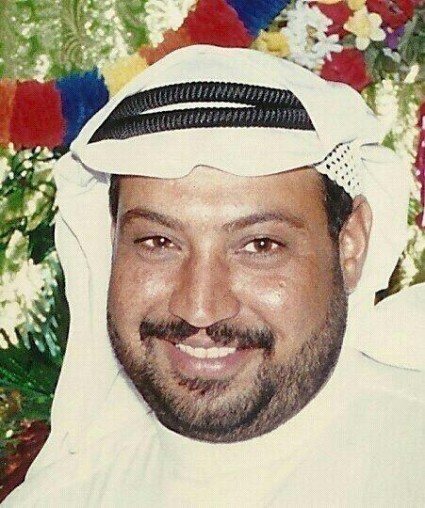
Bassil al-Qattan murdered by Bahrain Security forces with Chemical Gas
Bahraini protester dies after inhaling poisonous tear gas
18 December, 2012 – PressTV
A man has been killed by poisonous gas used by Bahraini regime forces in the ongoing anti-regime protests in the Persian Gulf state.
The victim, identified as Bassil al-Qattan, died on Thursday after inhaling tear gas fumes fired during a demonstration against the ruling Al Khalifa dynasty in the capital Manama last week.
His death comes amid excessive use of tear gas and stun grenades by Bahraini security forces as they continue their harsh clampdown on peaceful demonstrators who are calling for democratic reforms in the Arab country.
Locals said they had witnessed extensive use of tear gas, pellet shotguns and sound bombs during the massive ‘Bahrain’s Martyrs Day’ demonstration in Manama on Monday, which caused severe and critical injuries to protesters.
Witnesses also reported that police made at least 25 arrests, including women, during the rally.
Since mid-February 2011, thousands of pro-democracy protesters have staged numerous demonstrations in the streets of Bahrain, calling for the Al Khalifa royal family to relinquish power.
The Bahraini government promptly launched a brutal crackdown on the peaceful protests and called in Saudi-led Arab forces from neighboring states.
Dozens of people have been killed in the crackdown, and the security forces have arrested hundreds, including doctors and nurses accused of treating injured revolutionaries.
A report published by the Bahrain Independent Commission of Inquiry in November 2011 found that the Al Khalifa regime had used excessive force in the crackdown, criticizing Manama for torturing political activists, politicians, and protesters.
The protesters say they will continue to hold anti-regime demonstrations until their demand for the establishment of a democratically-elected government is met. …source
December 20, 2012 No Comments
Hamad tramples Martyr’s day demonstrations
Bahrain: Suppresses the Demonstrations on the Anniversary of the King’s Accession to the Throne and Arrests Activists
18 December, 2012 – Bahrain Youth Society for Human Rights
The Bahrain Youth Society for Human Rights (BYSHR) expresses it grave concern due to the Bahraini Authorities suppressing the demonstrations on the anniversary of the King’s accession to the throne (16 – 17 December). Since the year 2000, the Bahraini Authorities have begun to celebrate this day as a National Day. On the other hand, the political opposition movements and the local organizations consider this day as the ‘Martyrs Day’, since two demonstrators who were calling for a constitutional kingdom died during these days in the nineties.
On 16 December, hundreds demonstrated inside the villages of Bahrain calling for the demonstrations in the Capital of Bahrain (Manama) on 17 December in solidarity with the victims of the protests of the nineties and 14 February (what was called the Arab Spring), the Security Forces had used excessive force to disperse the demonstrations and at least 3 people were injured in the face due to using (shotgun), and several others wounded as well.
On 17 December, the Bahraini Authorities closed all entrances to Manama, and tried to prevent the demonstrators from gathering, as well as using teargas and stun grenades.
During the demonstrations in Manama, the Bahraini Authorities arrested almost 24 people according to the statistics of the BYSHR, among them 3 women, and the human rights activist Mr. Sayed Yousif Al-Muhafdha from the Bahrain Center for Human Rights (BCHR), and the blogger Mr. Hassan Jaber.The Bahraini authorities released almost 5 protesters later.
According to the lawyers of the BYSHR, those arrested were transferred to Hoora police station to interrogate them about their participation in the protests in Manama.
This takes places days after the speech of the Crown Prince Salman bin Hamad Al-Khalifa in the International Conference “The Manama Dialogue” about the Bahraini Authorities being ready to engage in a dialogue with the opposition for the stability of the political conditions in Bahrain, and the King’s speech about the public liberties in Bahrain.
The Bahrain Youth Society for Human Rights (BYSHR) calls for:
1. Immediately release the detainees from the peaceful demonstrations in Manama, and other villages, and to drop all charges related to freedom of expression and gathering.
2. The Bahraini Authorities have to abide by not restricting peaceful gatherings.
3. The Bahraini Authorities have to put an end to using excessive force against peaceful demonstrators.
December 20, 2012 No Comments
Said Yousif al-Muhafdah, jailed for being a witness to crimes by the regime
Bahrain Jails Activist for Covering Protests on Twitter
By LIAM STACK and ROBERT MACKEY – 19 Decemebr, 2012 – NYT The Lede
Bahrain jailed a leading rights activist for posts on Twitter documenting a protest on Monday in the capital, Manama, the Bahrain Center for Human Rights said in a statement.
The activist, Said Yousif al-Muhafdah, is the center’s head of documentation and the second member of the group to be jailed for using the social network in the past six months. A photograph of Mr. Muhafdah’s arrest was later posted on Twitter.
In July, Bahrain sentenced Nabeel Rajab, the rights center’s president, to three months in prison for joking on Twitter that supporters of Prime Minister Prince Khalifa bin Sulman al-Khalifa, who was appointed to his post in 1971, cheered him only after being bribed.
Mr. Muhafdah was arrested for reporting on Monday’s protest as it came under attack from Bahrain’s security forces. A look at his @SAIDYOUSIF Twitter feed shows that he covered the protest in detail, transmitting photos of protesters engulfed in tear gas and displaying gory injuries from shotgun pellets to his 77,000 followers. …source
December 20, 2012 No Comments
Bahrain: Human Rights Reform Caged
December 20, 2012 No Comments
Hamad, confused why he can’t find anyone for his “dialogue” – only dialogue left is about your exodus
December 19, 2012 No Comments
Between 16-17 December 25 people arrested, 31 villages attacked in violent assaults
December 19, 2012 No Comments
Almqha Marches for Freedom
December 19, 2012 No Comments
Revolution is knocking at the door Hamad
December 19, 2012 No Comments
The Revolution will Continue – Rajab Behind Bahraini Prison Bars: “I Am Free…Western Silence is Bought with Oil and Arms Deals”
Imprisoned Bahraini activist Nabeel Rajab speaks from behind bars with Rasha Abi Haydar, assuring listeners that despite the regime’s attempts, the peaceful revolution will continue.
Nabeel Rajab to As-Safir From Behind Bahraini Prison Bars: I Am Free…Western Silence is Bought With Oil and Arms Deals
Author: Rasha Abi Haydar – 14 December, 2012 – Translated 18 Decemebr, 2012 by: Tyler Huffman – Al Monitor – As-Safir
Nabeel Rajab is the most influential figure in Bahrain. He is a human rights activist who has been in prison since June 7, and a few days ago was sentenced to two more years in prison — after an initial sentence of three — on charges of organizing “unauthorized gatherings.” Since his arrest, Rajab has become a nuisance and a threat to the authorities’ prestige, and has exposed their continued violations.
Only a few days before his arrest, Rajab met with colleagues from As-Safir in an area that he “loves as much as Bahrain”: Hamra Street in Beirut. Today, after several attempts, As-Safir has succeeded in making his voice heard by the world. No one can silence his statements from behind prison bars.
As-Safir: Why did the judiciary uphold your imprisonment, when the sentences for similar charges are usually much lighter?
Rajab: In fact, the damage incurred by the Bahraini regime as a result of my imprisonment — in terms of its international reputation and image — outweighs the damage this imprisonment inflicts on my own liberties. Keeping a human rights activist in jail all this time because he participated in or called for peaceful demonstrations is something that the civilized world no longer accepts. I was shocked by the judgement issued against me because of something I posted on Twitter, or because [I organized] an unauthorized protest. I didn’t expect the authorities to imprison me as a result of such trivial charges, at a time when it is trying to appear as though it respects human rights.
The authorities claim that they do not prevent anyone from exercising his or her right to demonstrate, but the reality contradicts this. Bahraini prisons are teeming with detainees whose only charge is participating in peaceful marches against the government. Yet, unfortunately, the media has not highlighted their cases as they have mine.
The convictions issued against me reveal the size of the imbalance in the Bahraini judiciary, as well as the extent of the judiciary’s submission to the executive authorities. These charges have drawn international attention to the nature of the regime in Bahrain, and proved to the world that the authorities have had enough of my continued criticisms in the media and the press. [This has proven] that the authorities are willing to violate international law — regardless of the extent of these violations — in order to silence me.
As-Safir: But do you pose a threat to the regime, to the extent that they would imprison you for such a long period?
Rajab: I do not pose a threat to any political system. I am a rights activist. I have not, and do not, call for regime change or a coup. I defend the right of everyone to express their views and demands peacefully. The right to expression is guaranteed to all, both those who call for the reform of the regime and those who call for regime change. Had the regime dealt with these rights in the proper manner, there would been no opposition to the regime today. But the regime is afflicted with greed and tyranny, and is blind to anything but its own interests.
Here I want to tell the authorities that they must understand that violence only begets violence. All past experiences have confirmed that violence does not produce solutions, but only produces more violence and killing, and the past two years in Bahrain are the best proof of that. The continued ratifications of laws and legislation that restrict freedoms will not work.
As-Safir: Why has the regime declared war on human rights activists?
Rajab: This culture of human rights activism is new to the Arab world, and likewise to Bahrain, and human rights activists have had a lot of influence on people because their movements focus on demanding respect for moral and humanitarian standards, principles and values — far removed from seeking political positions or calling for specific political systems. Unfortunately, instead of working with human rights activists as experts [who can help] reform the legal structure to serve the people, the regime has considered them a direct threat to its existence, and decided to wage war on them.
The question here is: Has this targeting succeeded in stopping those demanding their rights? Of course not — in fact, the opposite is true. I believe that the regime now knows that imprisoning activists will not stop this phenomenon. Rather, the oppression practiced by the regime will spread this culture [of activism] more quickly. It has become clear that my imprisonment has doubled the amount of rights activism in Bahrain; it will not stop it or limit it.
[Read more →]
December 19, 2012 No Comments
Bahrain regime continue in self defeating litany of brutality and repression
Bahraini forces fire tear gas on Manama protests
18 December, 2012 – Islamic Invitation Turkey
Saudi-backed Bahraini forces have fired tear gas to disperse anti-regime protesters in the capital as Manama’s crackdown on the opposition continue.
Witnesses say hundreds of Bahrainis took to the streets across the capital overnight to protest against the ruling Al Khalifa family.
Activists say the situation in the capital remains volatile and that the military has set up checkpoints in and around Manama to prevent further demonstrations.
On Monday, regime forces arrested over 25 demonstrators in and around the capital, who took to the streets to call for the release of all jailed activists and demanded that King Hamad bin Isa Al Khalifa step down.
Sayed Yousif Al-Muhafda, the head of monitoring and evaluation of the Bahrain Center for Human Rights, was among those arrested. Bahraini forces used tear gas, rubber bullets, and stun grenades to break up the demonstrations.
Opposition rallies have continued in Bahrain in defiance of a government ban on public gatherings. The government’s harsh crackdown on demonstrations has also failed to keep protesters off the streets.
Scores have been killed, many of them under torture while in custody, and thousands more detained since the popular uprising in Bahrain began in mid-February 2011.
Protesters say they will continue holding anti-regime demonstrations until their demand for the establishment of a democratically-elected government is met. …source
December 19, 2012 No Comments
Bahrain: “rights denied” – protest ban defied
December 19, 2012 No Comments
Arming Offensively – US prepares ‘Vertically Integrated’ Gulf Allies for the Dirty work of War
U.S. arms to Gulf allies hint of strategy
By Rowan Scarborough – The Washington Times – 16 December, 2012
The largest infusion of U.S. arms ever for Persian Gulf allies has shifted more toward offensive weapons at the same time that President Obama’s military strategy says it will rely more on allied firepower in any future war.
The only war on the horizon for Saudi Arabia, the United Arab Emirates and four other Gulf coalition partners would be with nearby Iran.
Noting U.S. sales of air defense-penetrating F-16s and F-15s, satellite-guided bombs and a pending order for ordnance that can burrow deep and then explode, analysts say Gulf nations could participate in a U.S. air campaign to strike Iran’s nuclear sites.
These American-armed nations could either be part of an overall war plan or be forced to enter the battle once Iran counterattacks, as expected, with missile launches.
“The thinking certainly is that Iran would retaliate against the Gulf states, or at least against the facilities in the Gulf that we use,” said Kenneth Katzman, a Middle East analyst at the Congressional Research Service. “That would certainly draw the Gulf states into any conflict that went on. The Gulf might become embroiled in this conflict, and I think they’ve calculated it’s best to be prepared.”
There has been public focus on the U.S. military buildup in the Gulf — more aircraft carriers, warplanes and strike groups studded with Tomahawk cruise missiles; more minesweeping ships; a visit by Air Force F-22 stealth jets; and thousands of Army soldiers positioned in Kuwait.
But just as methodically, the George W. Bush and Obama administrations have approved a series of large arms sales that are giving some oil-rich Gulf states offensive capabilities that would make Iran think twice about an attack.
Defense Secretary Leon E. Panetta underscored the alliance Dec. 11 when he landed in Kuwait, a staunch Gulf ally, for consultations. He also spoke to some of the 13,500 U.S. troops stationed there.
“Our presence in Kuwait and throughout the Gulf helps advance the capabilities of partnering nations, deters aggression and helps ensure we’re better able to respond to crisis in the region,” Mr. Panetta told reporters beforehand.
At a Kuwait air base, he said America has 50,000 troops and an armada of warships in the region.
Desert Falcons
Mr. Obama’s strategic guidance in January enabled cuts in U.S. troop strength in part by saying that allies would be tasked with providing more firepower in future wars. To observers, that seems to mean the Gulf states would be asked to do more.
The Congressional Research Service, which tracks global arms sales, took special note in its latest report on U.S. weapons pouring into the Gulf states of Saudi Arabia, the United Arab Emirates, Qatar, Oman, Kuwait and Bahrain.
“The U.S. arms agreements with Saudi Arabia were extraordinary, and represent, by far, the largest share of U.S. agreements with the world or developing world in 2011,” the Congressional Research Service said.
Of $56 billion in total U.S. arms sales in 2011 to developing nations, more than half — $33 billion — were inked with the Saudi kingdom. U.S. defense contractors have seen a sales increase from $14 billion in contracts in 2010 to $56 billion in 2011, mostly thanks to oil-rich Gulf states.
In addition, some of the offensive hardware that the Gulf states have received from the U.S. is as good or in some cases better than the U.S. military’s.
Lockheed Martin has been selling the United Arab Emirates an F-16 “Desert Falcon” version known as “Block 60,” for which the country bankrolled the $3 billion development costs. According to DefenseIndustryDaily.com, it is a notch better than the latest Fighting Falcons flown by U.S. pilots.
The Desert Falcons boast extended range, new radars and targeting pods that clearly make the jet an offensive threat against Iran directly across Gulf waters.
The United Arab Emirates has been buying and flying Block 60s since the previous decade. It plans at some point to add other weapons — 2,000-pound bunker-busting bombs used against buried, cemented targets. Obama administration officials said a year ago that they were working to complete the sale.
“It’s perfectly possible the UAE could be asked to try to bomb aircraft shelters, hardened aircraft hangars’ stockpiles, coastal missile sites that are hardened,” Mr. Katzman said. “There are a range of targets that coalition partners like UAE could be asked to take out as part of strike package, if it comes to that.” …more
December 19, 2012 No Comments
Torture, An All-American Nightmare
Why Zero Dark Thirty Won’t Settle the Torture Question or Purge Torture From the American System
An All-American Nightmare
By Peter Van Buren – 18 December, 2012 – TomDispatch
If you look backward you see a nightmare. If you look forward you become the nightmare.
There’s one particular nightmare that Americans need to face: in the first decade of the twenty-first century we tortured people as national policy. One day, we’re going to have to confront the reality of what that meant, of what effect it had on its victims and on us, too, we who condoned, supported, or at least allowed it to happen, either passively or with guilty (or guiltless) gusto. If not, torture won’t go away. It can’t be disappeared like the body of a political prisoner, or conveniently deep-sixed simply by wishing it elsewhere or pretending it never happened or closing our bureaucratic eyes. After the fact, torture can only be dealt with by staring directly into the nightmare that changed us — that, like it or not, helped make us who we now are.
The president, a Nobel Peace Prize winner, has made it clear that no further investigations or inquiries will be made into America’s decade of torture. His Justice Department failed to prosecute a single torturer or any of those who helped cover up evidence of the torture practices. But it did deliver a jail sentence to one ex-CIA officer who refused to be trained to torture and was among the first at the CIA to publicly admit that the torture program was real.
At what passes for trials at our prison camp in Guantanamo, Cuba, disclosure of the details of torture is forbidden, effectively preventing anyone from learning anything about what the CIA did with its victims. We are encouraged to do what’s best for America and, as Barack Obama put it, “look forward, not backward,” with the same zeal as, after 9/11, we were encouraged to save America by going shopping.
Looking into the Eyes of the Tortured
Torture does not leave its victims, nor does it leave a nation that condones it. As an act, it is all about pain, but even more about degradation and humiliation. It destroys its victims, but also demeans those who perpetrate it. I know, because in the course of my 24 years as a State Department officer, I spoke with two men who had been tortured, both by allies of the United States and with at least the tacit approval of Washington. While these men were tortured, Americans in a position to know chose to look the other way for reasons of politics. These men were not movie characters, but complex flesh-and-blood human beings. Meet just one of them once and, I assure you, you’ll never follow the president’s guidance and move forward trying to forget. …more
December 19, 2012 No Comments
US floats article portraying Syrian Terrorists as concerned protectors of chemical weapons
Syria rebels fear chemical weapons
19 December, 2012 – Associated Press – The Daily Star
ANTAKYA, Turkey: The new Syrian rebel commander has told The Associated Press that his fighters are monitoring the regime’s chemical weapons sites, but don’t have the means to seize and secure them.
Gen. Salim Idris, who defected from the Syrian army in July, says he is “very afraid” a cornered regime will use chemical weapons in Syria’s civil war. Syria is said to have one of the world’s largest chemical arsenals.
Idris portrayed Syrian President Bashar Assad as a figurehead, saying decisions are made by Assad’s inner circle from the Alawite minority. Idris says the ruling elite won’t surrender and is willing to “set everything on fire.”
Idris also said late Tuesday that the regime has fired three Scud missiles so far and has more trained on northwestern Syria, ready to fire.
December 19, 2012 No Comments
Obama’s Human Rights Abusing ‘friends’ in Bahrain imprison children, without charges, in adult facilities
Bahrain: Child held without charge in adult prison
19 December 2012 – Amnesty
The detention of a 16-year-old Bahraini boy in an adult prison has been extended for a further week despite the Bahraini authorities’ failure to bring any charges against him, which Amnesty International said violates international standards of justice.
On 11 December, police raided the family home of Mohammad Mohammad ‘Abdulnabi ‘Abdulwasi in Sitra – an island east of the capital Manama – and arrested him, despite failing to produce a warrant. Family members present at the time allege that riot police broke the main door and took money and other possessions with them.
Since his arrest, the 16-year-old has not been allowed to see his family or a lawyer, and his unlawful detention in Dry Dock Prison – a facility for adults – has been extended until 26 December.
“It is absolutely shocking that Bahraini authorities broke into this boy’s house, detained him unlawfully and are still holding him in an adult prison, despite never bringing any charges against him,” said Hassiba Hadj Sahraoui, Deputy Director of Amnesty International’s Middle East and North Africa Programme.
“Mohammad Mohammad ‘Abdulnabi ‘Abdulwasi should not be treated as an adult before the law, and the authorities must immediately grant him access to his family and lawyer. Unless they can disclose the reason for his arrest and charge him with an internationally recognizable offence, he should be set free.”
‘Abdulnabi ‘Abdulwasi’s family did not know his whereabouts for two days after his arrest. On 18 December he was allowed to call them and told them he was being held at Dry Dock Prison, but he has yet to be allowed a visit from relatives or a lawyer.
No charges appear to have been brought against him and the exact reasons for his arrest remain unknown.
Child detention concerns
In the past few months, a growing number of 15 to 17-year-olds have been held in adult prisons and detention centres in Bahrain. Some sources put the number as high as 80.
Many of these children were arrested during demonstrations, where they were accused of “illegal gathering” and rioting.
In some cases, they appear to have been targeted and punished solely for exercising their rights to freedom of expression and assembly.
Some of the child detainees have alleged they were beaten during their arrest or on the way to detention, and some have also been forced to sign “confessions”.
Under international law, anyone under the age of 18 is a child, and children suspected of a criminal offence should be treated according to the rules of the juvenile justice system.
“Children should always be held separately from adults, and the Bahraini authorities must protect all child detainees from torture or other ill-treatment,” said Hadj Sahraoui.
“The Bahraini authorities’ disregard for international juvenile justice standards is just another sad indicator of the ongoing deterioration in the country’s human rights situation.” …source
December 19, 2012 No Comments
UAE arrests seven for twitter crimes of blogging critique of government and free expression
President Obama’s hostile and aggressive, perhaps even murderous, pursuit of Julian Assange has helped create a “hostile environment” globally toward all who would expose government corruption and violate Human Rights that are deemed ‘friendly ‘ by the USG. The Obama administration has become an enabler of ‘friendly regimes’ that brutally crush their citizens who are evolving internet media tools for ‘free expression’ and documentation of Human Rights abuses they are subject to. Phlipn out.
Seven online activists arrested in United Arab Emirates
Bill Law – BBC – 18 December, 2012
The Emirates Centre for Human Rights said three UAE nationals were detained in Saudi Arabia on Monday and then handed over to the UAE authorities.
It came days after four other activists were arrested in connection with a Twitter account that is critical of the government, the UK-based group added.
Last month, the UAE government tightened the law on internet use.
It became a criminal offence to deride or damage the state or its institutions, or to organise unauthorised demonstrations.
Human rights groups have said the legislation places severe restrictions on the rights to free expression and free association and assembly.
‘Most-wanted activist’
The first four online activists were arrested last week, according to the Emirates Centre for Human Rights.
The authorities were said to be looking for a critic of the government who appears to have received leaked documents from the interior ministry. The activist has a Twitter account, @weldbudhabi, with more than 11,000 followers.
Screengrab of @weldbudhabi Twitter account The Twitter account @weldbudhabi is critical of the government and has more than 11,000 followers
“He is the most wanted cyber activist in the UAE,” a human rights campaigner told the BBC. “I told him it would be wise to stay quiet.”
The activist’s Twitter account was reportedly hacked by the authorities on Friday – the day Saeed Majed Alshaer al-Shamsi was arrested.
The authorities apparently believed Mr Shamshi was behind @weldbudhabi. But the real owner of the account subsequently used Twitter to say they had detained the wrong person.
The three others arrested were believed to have messaged the Twitter account on the Thursday and Friday.
The activist behind @weldbudhabi had been identifying plainclothes officers who work for the interior ministry’s security agency.
“He’s really been getting under their skin, really annoying them,” the human rights campaigner told the BBC.
On Tuesday, activists reported that three Emiratis who had been on religious pilgrimage in Saudi Arabia had been detained on Monday night and turned over to the UAE authorities. They are said to have expressed their support on Twitter for jailed activists.
These latest arrests follow the detention of the 18-year-old blogger, Mohammed Salem al-Zumer, earlier this month.
Mr Zumer is the son of a poet and the nephew of Khaled al-Sheiba al-Nuami, who was detained earlier this year along with more than 60 other civil society activists, some with ties to Islah – a local group that advocates greater adherence to Islamic precepts.
Government and police officials have said the crackdown is a response to a foreign-inspired Islamist plot that aims to overthrow the government.
But the Emirates Centre for Human Rights said at least three of those held in recent days were liberals or secularists and had no links with Islah. …source
December 18, 2012 No Comments
Silencing Free Expression in Bahrain
December 18, 2012 No Comments
Bahrain: Sayed Yousif Al-Muhafdha jailed for “twitter crimes”
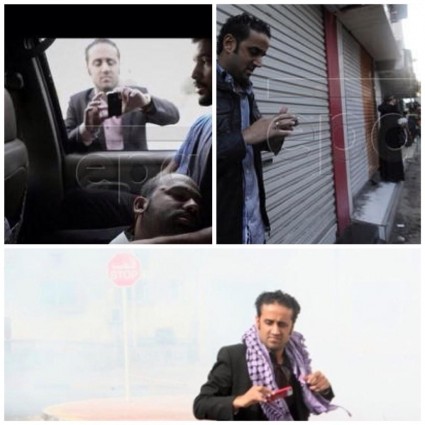 Sayed Yousif Al-Muhafdha tweets picture of wounded protester
Sayed Yousif Al-Muhafdha tweets picture of wounded protester
Bahrain: Arrest and detention of human rights defender Mr Sayed Yousif Al-Muhafdha
18 December, 2012 – Front Line Defenders
On 18 December 2012, the Public Prosecution Office ordered human rights defender Mr Sayed Yousif Al-Muhafdha to be detained for a period of seven days following his arrest the previous day after attendeding a protest in Manama.
Sayed Yousif Al-Muhafdha is the acting vice-president of the Bahrain Centre for Human Rights (BCHR), one of the three short-listed nominees for the 2012 Martin Ennals Award for Human Rights Defenders.
On 17 December 2012, Sayed Yousif Al-Muhafdha was arrested in Manama on charges of spreading false information over Twitter. Prior to the arrest he was monitoring and documenting a protest in Manama as it unfolded. The following day, the Public Prosecution Office ordered his detention for seven days pending an investigation. He is currently being held in Hooth Al-Jaff prison in the Governorate of Muharraq.
The arrest took place on the eve of a visit to Bahrain by a delegation of Members of the European Parliament (MEPs) with a focus on human rights issues. Sayed Yousif Al-Muhafdha previously attended a round table on the human rights situation in Bahrain at the European Parliament (EP) in Brussels on 4 December 2012. The MEP who hosted the round table was not granted a visa to be part of the EP delegation.
This is the second time the human rights defender has been arrested in the last two months. On 2 November 2012 in the village of Diraz, he was arrested on charges of rioting and participating in an illegal gathering. These charges related to a protest that took place in the village that day and which the human rights defender denied having participated in. He was released without charge on 14 November 2012.
Front Line Defenders is concerned by the arrest and detention of Sayed Yousif Al-Muhafdha and believes these measures are solely motivated by his peaceful advocacy in defence of human rights in Bahrain. Front Line Defenders has previously issued urgent appeals and updates on his situation on a number of occasions including on 5 November 2012 and 15 November 2012. …source
December 18, 2012 No Comments
Russia takes position for Syria exodus
Russia sends warships to Syria for possible evacuation
18 December, – By Erika Solomon – Reuters – The Daily Star
BEIRUT: Russia sent warships to the Mediterranean to prepare a potential evacuation of its citizens from Syria, a Russian news agency said on Tuesday, a sign President Bashar al-Assad’s key ally is worried about rebel advances that now threaten even the capital.
Moscow acted a day after insurgents waging a 21-month-old uprising obtained a possible springboard for a thrust into Damascus by seizing the Yarmouk Palestinian camp just 2 miles from the heart of the city, activists said.
The anti-Assad opposition has posted significant military and diplomatic gains in recent weeks, capturing a series of army installations across Syria and securing formal recognition from Western and Arab states for its new coalition.
Assad’s pivotal allies have largely stood behind him. But Russia, his main arms supplier, appeared to waver this week with contradictory statements repeating opposition to Assad stepping down and airing concerns about a possible rebel victory.
Russia’s Interfax news agency quoted unnamed naval sources on Tuesday as saying that two assault ships, a tanker and an escort vessel had left a Baltic port for the Mediterranean Sea, where Russia has a port in Syria’s coastal city of Tartus.
“They are heading to the Syrian coast to assist in a possible evacuation of Russian citizens … Preparations for the deployment were carried out in a hurry and were heavily classified,” the Russian agency quoted the source as saying.
It was not possible to independently verify the report, which came a day after Russia confirmed that two citizens working in Syria were kidnapped along with an Italian citizen.
In Damascus, activists reported overnight explosions and early morning sniper fire around the Palestinian refugee camp of Yarmouk. The Yarmouk and Palestine refugee “camps” are actually densely populated urban districts home to thousands of impoverished Palestinian refugees and Syrians.
“The rebels control the camp but army forces are gathering in the Palestine camp and snipers can fire in on the southern parts of Yarmouk,” rebel spokesman Abu Nidal said by Skype.
“Strategically, this site is very important because it is one of the best doors into central Damascus. The regime normally does not fight to regain areas captured any more because its forces have been drained. But I think they could see Yarmouk as a red line and fight back fiercely.”
Syria hosts half a million Palestinian refugees, most living in Yarmouk, descendants of those admitted after the creation of Israel in 1948, and has always cast itself as a champion of the Palestinian struggle, sponsoring several guerrilla factions. …source
December 18, 2012 No Comments
Hamad moves to set-up legal process to protect GCC Human Rights Abusers
HM the King’s Initiative to Set up an Arab Court for Human Rights Discussed
18 December, 2012 – Bahrain News Agency
Manama, Dec. 18. (BNA) – His Majesty King Hamad bin Isa Al Khalifa’s initiative to establish an Arab Court for Human Rights, in order to consolidate human rights protection and keep abreast of the latest international developments in this regard, will today top the agenda of the third meeting of senior Arab legal and human rights experts, held at the headquarters of the Arab League in Cairo under the chairmanship of its Secretary-General Dr. Nabil Al-Arabi.
On the occasion, the Foreign Ministry’s Undersecretary for Regional and GCC Affairs Ambassador Hamad Ahmed Abdulaziz Al Amer asserted that HM the King’s initiative stems from a desire to develop the institutional framework of human rights in the region and address the shortcomings that exist in the Arab Charter on Human Rights, adding the court will bring about a quantum leap in the field of human rights protection in the Arab world and prevent foreign sides from using the human rights issue to harm Arab countries.
It is to be noted that the meeting is in line with the resolution issued by Arab League on March 10th, 2012 to set up an Arab Court for Human Rights.
The panel has held a number of meetings and will convene in Bahrain next month to discuss and approve the resolution and then submit their report to the next Arab Summit, to be hosted by Doha by the end of March, 2013. …source
December 18, 2012 No Comments
Bahrain Normal: Arbitrary hassassment and assualt by “police” on Business Patrons
December 18, 2012 No Comments

